Manufacturing jobs aren't just about assembly lines and repetitive tasks. There's a whole world of opportunities ranging from production roles to quality control and even management. It's like a buffet of options for people with different skills and interests.
Did you know that the U.S. manufacturing sector has over 12 million jobs as of 2023? That's a lot of positions! So, if you're considering a career in manufacturing, it's worth checking out the variety of roles you can explore. From hands-on production jobs to more strategic management roles, there's something for everyone.
The government has been rolling out schemes to boost this sector, making it an exciting time to dive into manufacturing. These programs aim to revitalize factories and train workers, adding a modern twist to traditional roles. Seen a factory tour lately? It might not look like you imagined—think robotics and cutting-edge tech enhancing human skills.
- Overview of Manufacturing Jobs
- Production and Assembly Roles
- Quality Control and Management
- Impacts of Government Schemes
Overview of Manufacturing Jobs
Thinking about diving into the big world of manufacturing jobs? You're looking at an industry that's as dynamic as it gets. The sector encompasses a wide range of roles that keep the wheels of production turning smoothly. Let's break it down.
Roles and Responsibilities
There's everything from the nitty-gritty of assembly line jobs to more technical roles in product development and quality control. Assembly line workers focus on putting together products, often in a repetitive but crucial process that ensures everything is just right. These roles are the heartbeat of manufacturing, responsible for creating everything we use daily.
If you lean more towards precision and safety, roles in quality control might catch your interest. These folks make sure that each product meets the necessary standards before it goes out into the world. It's a job of diligence and expertise, ensuring the brilliance of the final product.
Innovative Trends
Fancy a bit of innovation? There are jobs focusing on cutting-edge technologies like automation and robotics. With technology shaping the future of manufacturing, roles here offer some exciting challenges and learning opportunities. Imagine working alongside robots to create the latest tech marvels!
Diversifying Opportunities
Manufacturing isn't just about getting your hands dirty. There are also opportunities in management, human resources, and logistics. These roles help steer the ship, ensuring that everything runs smoothly, from production to distribution.
Fact Check
Here's a fun fact: The manufacturing industry was responsible for 15% of GDP in the United States as per the latest figures in 2023. That's a testament to its economic significance and its role as a critical employment sector.
So, whether you're starting with entry-level production roles or aiming for a specialized technical job, there's a place for you in manufacturing. And don't forget, with government schemes supporting this sector, now might be the perfect time to jump in and start building a rewarding career!
Production and Assembly Roles
When you think of manufacturing jobs, production and assembly roles often come to mind first. These are the backbone of the industry, making sure that everything from cars to toothbrushes gets made efficiently. But don't let the hands-on nature fool you—there's a lot more going on than just putting pieces together.
The Heart of Manufacturing
Production and assembly roles are crucial. They involve the actual making of products and can range from working with raw materials to the final touches on a finished item. These jobs require attention to detail, some technical know-how, and the ability to work as part of a team. For example, think about the effort that goes into manufacturing an automobile. It involves hundreds of components and assembly workers ensuring each part fits perfectly.
Variety in Roles
Within production and assembly, you’ll find a range of roles. Some examples include machine operators, supervisors, and assemblage workers:
- Machine Operators: These folks run the machinery that produces goods. It's not just button-pushing; it involves understanding the machines and troubleshooting issues.
- Assembly Line Workers: They put together each part of a product. It can be repetitive, but each step is crucial for the final product.
- Supervisors: They oversee the production process, ensuring that everything runs smoothly and safely while meeting quality standards.
The Impact of Technology
With the rise of automation and robotics, production roles are changing. Instead of replacing workers, new technology often aids them, increasing efficiency and precision. Workers might now spend more time programming or maintaining machines than working directly on the production line.
| Job Title | Average Salary (2023) | Automation Impact |
|---|---|---|
| Machine Operator | $44,000 | Moderate |
| Assembly Line Worker | $38,000 | High |
| Supervisor | $62,000 | Low |
A great thing about these jobs is that many don't require a college degree, making them accessible for a wide range of people. Moreover, some government schemes offer training to help people transition into these roles, addressing both skill gaps and employment rates.
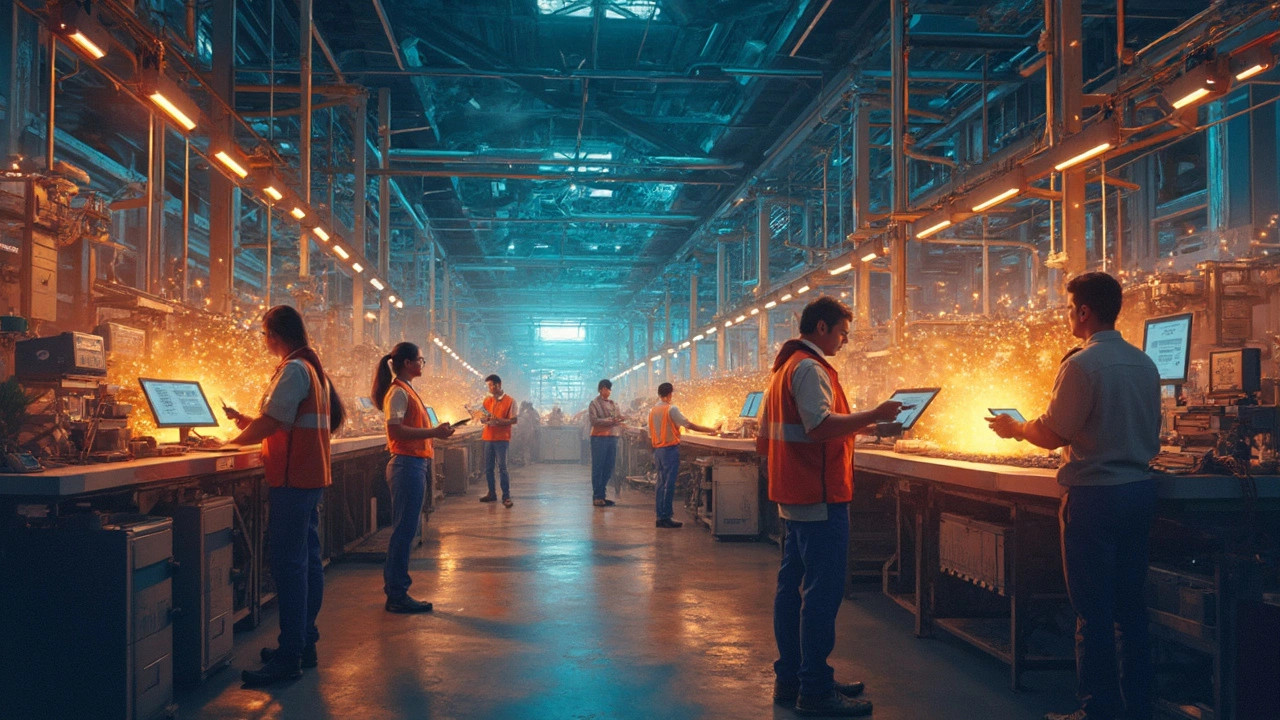
Quality Control and Management
When it comes to manufacturing jobs, quality control and management are like the unsung heroes. They make sure everything that rolls off the production line is top-notch. We often picture manufacturing as fast-paced and routine, but these roles add that layer of precision and strategy needed to keep factories running smoothly.
Quality control usually involves measuring and testing products against specified criteria. It's not just about catching defects; it's also about finding ways to improve processes. Think of it like being a detective, but instead of solving crimes, you're solving production hiccups.
What Do Quality Control Specialists Do?
These folks are busy bees, carrying out inspections, conducting product tests, and ensuring compliance with safety and legal standards. They're an essential part of the manufacturing process, ensuring that products meet customer expectations and regulatory requirements.
"Quality means doing it right when no one is looking." – Henry Ford
Ford might've been onto something there. Maintaining high standards requires a keen eye and a dedication to excellence, much like his own ethos during the industrial boom.
Management Roles
Management in the manufacturing sector involves overseeing various operations, from logistics to workforce coordination. Managers are responsible for making strategic decisions that affect production outcomes, workforce dynamics, and financial performance. It's about ensuring everything runs like clockwork.
Skills for Success in Management
- Leadership: Guiding and motivating teams to meet goals.
- Problem-solving: Identifying and resolving operational challenges.
- Communication: Keeping everyone in the loop with clear, concise updates.
- Project Management: Coordinating projects, timelines, and resources effectively.
Incorporating government schemes can also play a significant role here. By leveraging incentives, managers can enhance training programs, invest in better technology, and ultimately improve productivity. It's a win-win!
Here’s a little nugget of info that might surprise you: According to a 2023 survey by the National Association of Manufacturers, companies that prioritize quality control and invest in management training see a 20% increase in product satisfaction rates.
Impacts of Government Schemes
When governments roll out schemes supporting the manufacturing jobs sector, there's often a buzz of excitement. These initiatives aren't just about opening factories. They aim to reshape how manufacturing works and who's working in it. Think of it as an upgrade button for the industry.
Boosting Job Opportunities
One major impact of these schemes is job creation. With incentives for companies to hire, you might see new factories popping up or existing ones expanding. The goal? To employ more people in those production roles and build a robust workforce.
Skill Development and Training
Another biggie is training. Some schemes offer programs to skill up current workers or train fresh hires. These programs focus on the latest tech in manufacturing, preparing folks for the future rather than the past. It ensures the workforce keeps pace with innovations.
Encouraging Innovation
Innovation is also a winner here. Grants are sometimes given to companies that prioritize research and development. This nudges the industry toward cutting-edge tech and smarter processes, making products better and the work environment more efficient.
Quick Look: India's Government Initiative
For a concrete example, India's "Make in India" initiative has made waves. By providing tax benefits and setting up special economic zones, it aims to transform India into a global hub for manufacturing.
| Year | Scheme Launched | New Jobs Created |
|---|---|---|
| 2023 | Tech Factory Support | 20,000 |
| 2024 | Green Manufacturing Drive | 15,000 |
Whether you’re just entering the workforce or looking to shift gears, understanding these schemes can help make sense of what the future holds in government schemes manufacturing. Keep an eye out—they’re likely to change how the industry operates in a big way!
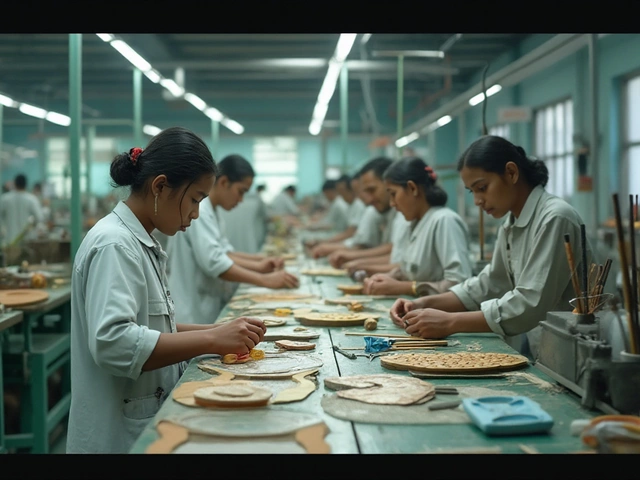
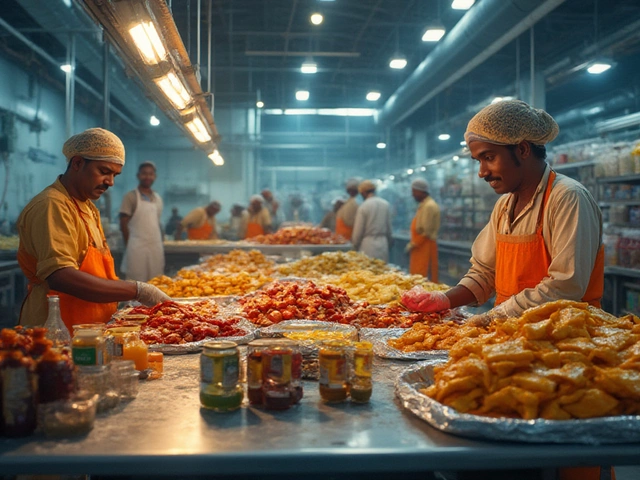
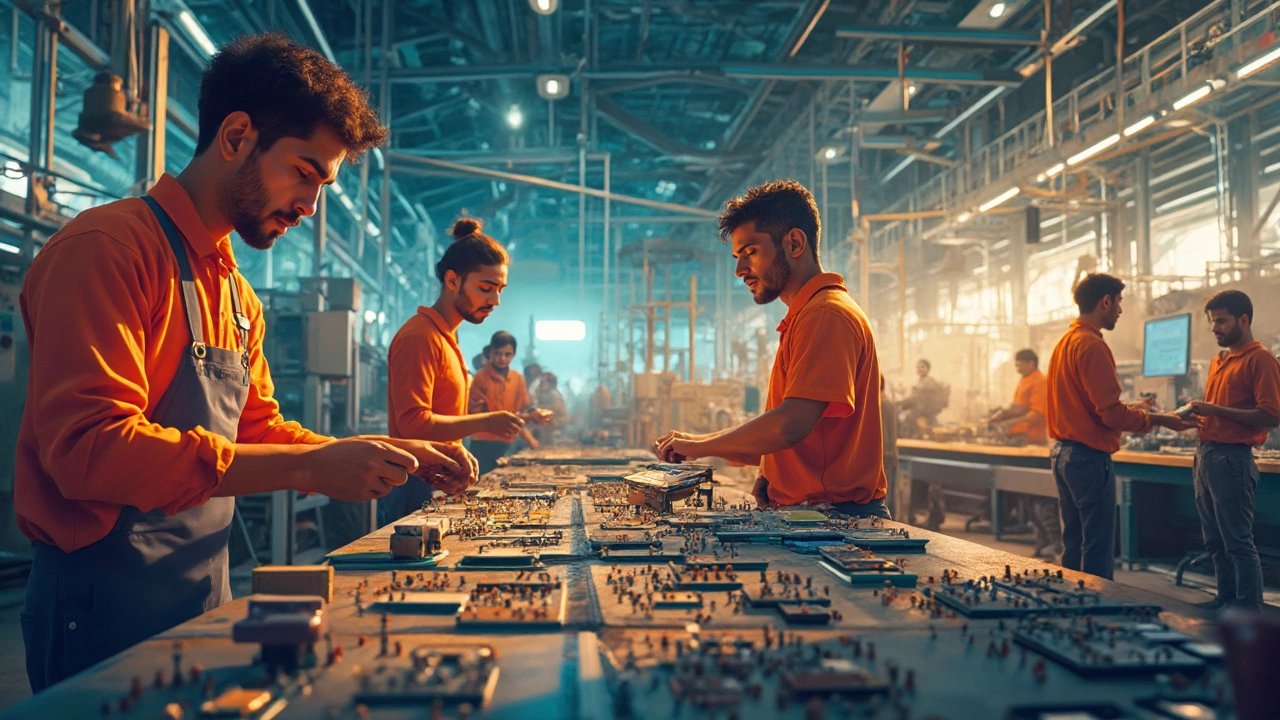

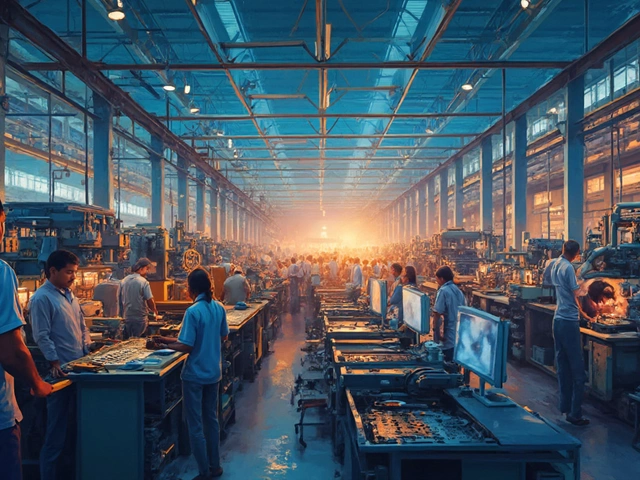
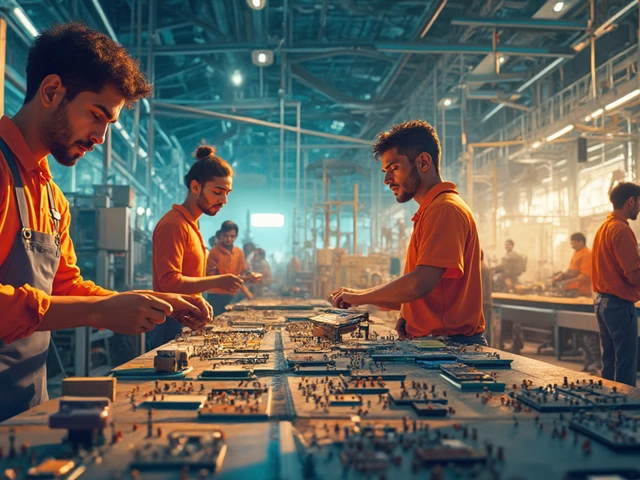
Write a comment